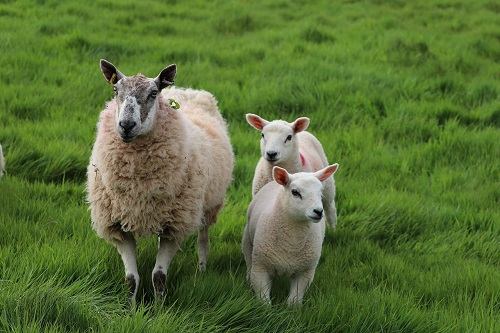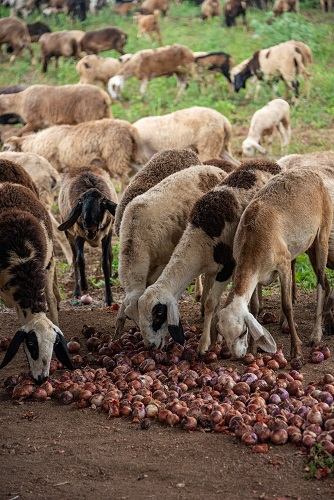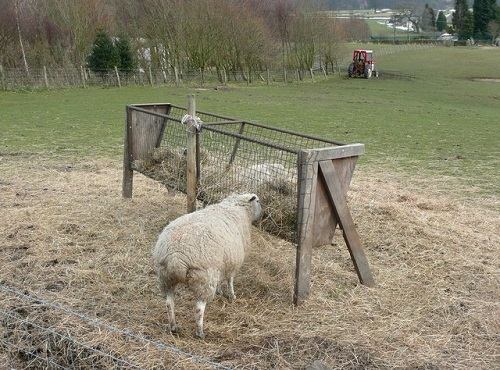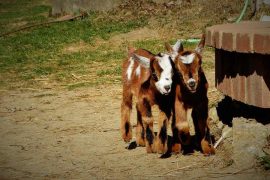Sheep usually eat grass, cloves, legumes, forbs, and other plants that grow in the area they reside. They are animals who prefer a nutritious diet, hence, love to consume plants and food items that provide them nutrients. Apart from these, sheep also eat hay and grains, which can be fed to them according to their dietary requirements. They love green pastures and enjoy roaming freely with their companions. So, if you are planning to get a sheep, be delighted that you are also getting a free lawnmower at the same time.
What Does a Sheep Eat Daily?
Sheep should consume up to 2-3% of their body weight everyday. This diet could include pastures and hay, and grains to supplement the requirements. It is only when these requirements are met that the sheep will be able to maintain its body and be healthy. A balanced diet for them is similar to that humans too follow, a diet that contains fiber, carbohydrates, minerals, vitamins, proteins, and fat in the right amounts.
Since sheep are grazing animals, if you have enough pasture, they will spend a good amount of time grazing in the greens. And yes, the quality of the pasture depends on the climate and moisture levels. Hence, arid and semi-arid regions may not have pastures that provide the sheep with much nutrients as compared to those places with good rainfall and moisture content.

Sheep love to eat grass, clover, and forbs, forbs being their favorite pasture. The nutrients this flowering plant offers them are immense, therefore, sheep will always go for forbs even if they are provided with all sorts of pasture. Also their grazing habits and dietary requirements also depend on the region and the kinds of plants that grow there. This could affect the food choices of sheep. They usually consume a large variety of plants and grass, hence will adapt to new environments quickly.
Grains and Supplements for Your Sheep
Since domestic sheep are raised with specific intentions, they require some supplements in terms of diet for them to fulfill their respective roles. Therefore, it is important to feed them grains and other supplements to enable them to be healthy and have a long life. Pregnant ewes and lambs are generally fed these to meet their nutrient needs.
Grain is not an unnatural or artificial feed for sheep. They are made from parts of plants such as the seed parts of corn, barley, and oats, and these are parts the sheep will consume whenever they find it. To this, vitamins and minerals, along with soybean meal or cottonseed meal is added for the perfect balance of nutrients. Though grain is rich in all these, care must be taken to prevent the sheep from overfeeding. Overconsumption of grains could lead to digestive issues, and if you are starting grains for the first time, do it in a gradual manner and make sure to take it slowly.
Feeding Sheep When Pasture Is Not Available
It is difficult to find green pastures throughout the year, and sometimes you could even face a shortage of fresh grass due to several reasons. And during those situations, sheep survive on stored feed, which will provide them with the required nutrients till fresh pastures are available. This diet consists of a combination of hay, silage, and haylage and by-products of corn, barley, peanut hulls, etc.
Hay is the grass that is cut and dried for storage which is widely used as a food supplement for sheep. Silage too, is grass, but grass is fermented before drying and storing. This is also called haylage, and when feeding this, you must take caution to check for molds and signs of it going bad, as it could cause health issues for your sheep. Hay and silage are used by farmers during winters and droughts, when fresh pasture is hard to come by.
Sheep have extremely efficient digestive systems that can break down and digest food with ease and take out the most nutrients from it. And during the months when pasture is less, sheep could also be fed crop by-products like soybean hulls, peanut hulls, and cotton seeds. This practice also ensures less wastage of products and offers an efficient way instead of disposing of them. They can also be fed pumpkins, apples, and onions as occasional treats.

How Much Water Does a Sheep Require?
Water is of utmost importance to sheep, as is to other living beings. Water too provides the necessary nutrients for sheep to lead a healthy life. Sheep are said to consume up to 14 liters of water (in summer), which also changes with their age, diet, and place where they live. If they live in dry areas, having dry hay and grass, they will require more water to sustain their health. On the contrary, sheep that consume moist foods will drink less water as their diet takes care of part of their water requirements. And while providing them with water, make sure that it is clean so they will not drink dirty water. Salt content in the water should also be checked before feeding them. For weaners, it should not go beyond 3800 ppm, while for adults, salt content could go up to 6400 ppm.
Foods Sheep Cannot Consume
As good as you learn about what to feed your sheep, it is also crucial to know what they should not eat as well. The most important point to note here, is to refrain from feeding them meat. Sheep’s ruminant digestive system does not make the enzymes required to break down the meat and hence causes a problem for them. They should also be kept away from human foods like tomatoes, potatoes, avocados, broccoli, cabbage, dairy products, chocolates, etc.
While providing store-bought feed, look out for plastic, such as strings that come entangled with the hay. Foreign and indigestible particles, if ingested, could pose serious threats to the well-being of your sheep. Also, check whether the feed is safe for sheep as some goat supplements contain traces of copper in them, which is toxic to sheep. And, as already mentioned above, grains should not be fed above the limits. This could seriously damage their stomach linings.
Some Feeding Tips
Sheep being grazing animals, it is important that they have a variety of plants and grass included in their diet. So, if you have enough pasture land, try planting a variety of plants and legumes that could provide them with the much-needed nutrients. And in case you have less land, mix dry feed and grains with available fresh feed to make a balanced diet for them.

Since sheep rechew their food after once ingesting it, they must have enough time between grazing to indulge in this process. Generally, sheep graze for about 7 to 8 hours a day. Hence, letting them out for grazing early in the morning and afternoons with a break in the noon will be most suitable for them to complete their digestion process.
You can also adopt rotational grazing if you have enough land. This could help the land stay fertile and healthy, all the while preventing pasture depletion. Hay and silage, which are dry feed, must be stored properly and fed in moderation according to their requirements. Silage and haylage should be given extra care while storing to prevent them from getting spoiled.
Conclusion
If you have read this far, you must now be well aware of what a sheep eats. These woolly animals too, are not too expensive to maintain and manage. And if you have free space with fertile soil, sheep are a wonderful choice among farm animals that can guarantee you good yield and happiness at the same time. So, if you are planning to go for it, make sure to keep your sheep happy too, by providing them with the food they love, a balanced diet, pastures to roam around, and clean water all the time.

![What Does a Sheep Eat? [Plus Feeding Tips] what does a sheep eat](https://donkeyonfarm.com/wp-content/uploads/2023/07/flock-of-sheep-sheep-pair-togetherness_11zon.jpg)

![Can Goats Swim? [Plus How to Treat a Wet Goat?] can-goats-swim](https://donkeyonfarm.com/wp-content/uploads/2023/06/can-goats-swim-270x180.jpg)
![How to Care for a Pregnant Goat [Tips to Keep Them Happy] how to care for a pregnant goat](https://donkeyonfarm.com/wp-content/uploads/2023/08/how-to-care-for-a-pregnant-goat_11zon-270x180.jpg)

![What Are Fainting Goats? [Why Do They Faint?] what are fainting goats](https://donkeyonfarm.com/wp-content/uploads/2023/07/Myotonic_Goat_-_17003671880_11zon-270x180.jpg)